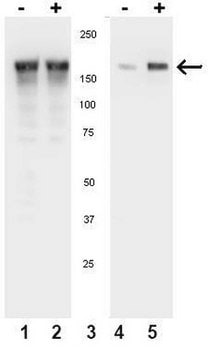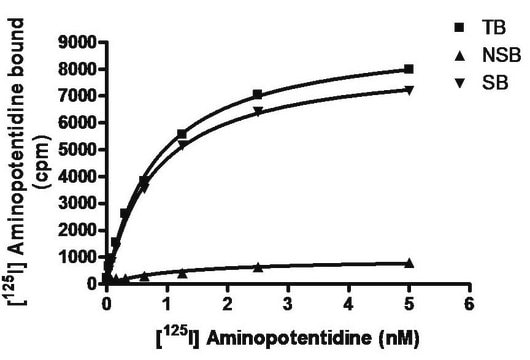09-310
Anti-phospho-EGFR (Tyr1069) Antibody
from rabbit, purified by affinity chromatography
Synonyme(s) :
Receptor tyrosine-protein kinase ErbB-1, avian erythroblastic leukemia viral (v-erb-b) oncogene homolog, cell growth inhibiting protein 40, cell proliferation-inducing protein 61, epidermal growth factor receptor, epidermal growth factor receptor (avian
About This Item
Produits recommandés
Source biologique
rabbit
Niveau de qualité
Forme d'anticorps
affinity isolated antibody
Type de produit anticorps
primary antibodies
Clone
polyclonal
Produit purifié par
affinity chromatography
Espèces réactives
human
Réactivité de l'espèce (prédite par homologie)
primate (based on 100% sequence homology), rat (based on 100% sequence homology), mouse (based on 100% sequence homology), pig (based on 100% sequence homology), horse (based on 100% sequence homology)
Technique(s)
ELISA: suitable
immunocytochemistry: suitable
western blot: suitable
Numéro d'accès NCBI
Numéro d'accès UniProt
Conditions d'expédition
wet ice
Modification post-traductionnelle de la cible
phosphorylation (pTyr1069)
Informations sur le gène
horse ... Egfr(100067755)
human ... EGFR(1956)
mouse ... Egfr(13649)
pig ... Egfr(397070)
rat ... Egf(25313)
Description générale
Spécificité
Immunogène
Application
Apoptosis & Cancer
Signaling
Kinases & Phosphatases
Qualité
Western Blot Analysis:
1:1,000 dilution of this antibody detected Tyr1069 phosphorylated EGFR on 10 g of EGF treated A431 lysates.
Description de la cible
Liaison
Forme physique
Stockage et stabilité
Handling Recommendations: Upon receipt, and prior to removing the cap, centrifuge the vial and gently mix the solution.
Remarque sur l'analyse
Untreated and EGF treated A431 lysates
Clause de non-responsabilité
Vous ne trouvez pas le bon produit ?
Essayez notre Outil de sélection de produits.
Code de la classe de stockage
12 - Non Combustible Liquids
Classe de danger pour l'eau (WGK)
WGK 1
Point d'éclair (°F)
Not applicable
Point d'éclair (°C)
Not applicable
Certificats d'analyse (COA)
Recherchez un Certificats d'analyse (COA) en saisissant le numéro de lot du produit. Les numéros de lot figurent sur l'étiquette du produit après les mots "Lot" ou "Batch".
Déjà en possession de ce produit ?
Retrouvez la documentation relative aux produits que vous avez récemment achetés dans la Bibliothèque de documents.
Notre équipe de scientifiques dispose d'une expérience dans tous les secteurs de la recherche, notamment en sciences de la vie, science des matériaux, synthèse chimique, chromatographie, analyse et dans de nombreux autres domaines..
Contacter notre Service technique








